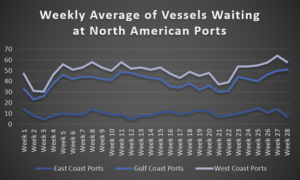
Figure 1: Daily count of waiting cargo vessels outside major North American ports, 2022; Source: Everstream Analytics.
Talks have stayed relatively quiet, but landside labor issues are deteriorating. Over the last week, railroad workers with the Brotherhood of Locomotive Engineers and Trainmen (BLET) approved a strike of over 57,000 members, prompting President Biden to form an emergency board to facilitate negotiations between Class-I carriers and labor.
The Presidential order triggers a cool-down period in which strikes or lockouts will not occur, buying the parties more time to reach an agreement. The order also pushes any potential disruptions further out, possibly leaving shippers with fewer transit options during back-to-school season. Existing chassis shortages and rail metering are signs that the sector is vulnerable to strikes and that labor may take advantage.
Concurrently, truckers in protest of Assembly Bill 5 (AB5) have disrupted landside operations. AB5 requires workers to satisfy a three-part test to be considered independent contractors, or else be employees entitled to job benefits. In response, truckers blocked the Port of Oakland from July 18-19, forcing the facility to cancel night operations at SSA, TraPac, and Everport terminals.
Given the number of potential labor actions across modalities, transit-related disruptions are likely to occur during the West Coast port negotiations. This will ultimately strengthen the ILWU’s negotiation position by putting the PMA under pressure to find an agreeable solution to avoid further disruption.
Everstream customers are receiving detailed information about this disruption.
Contact us to learn how we can give you a complete view of the risks affecting your end-to-end supply chain and what you can do to mitigate them.
